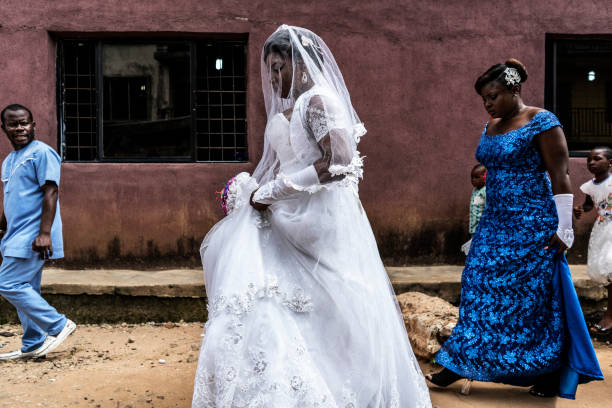“My Daughter Is Not for Sale”: The Misunderstood Rebellion Against Bride Price

When Symbols Are Misread
Across many African communities, especially in Nigeria, the act of paying bride price has long served as a cultural ceremony — not a commercial transaction. It is not a payment for the woman, but a gesture that binds two families, blesses a union, and honors the years of nurturing the bride’s family invested.
Yet, in a twist of modern perception, some fathers today have begun to return the bride price — and not at the end of a failed marriage, but right at the beginning, shortly after the ceremonies. Their message is clear and often emphatic: “My daughter is not for sale.” But in making this declaration, they may be unwittingly abandoning something deeper — a heritage built not on ownership, but on reverence.
A Gesture That Misunderstands Its Meaning
At the heart of this practice is a noble instinct: to preserve the dignity of women. In a world that increasingly equates bride price with trafficking or commodification, some families want to distance themselves from anything that could be misconstrued as patriarchal. The return of the bride price is thus framed as a progressive act — an affirmation that their daughter was never anyone’s to purchase.
But in that gesture, they risk misreading the very tradition they’re trying to reject. Because bride price, in its original form, was never about purchasing a wife. It was about recognizing the social value of family. It was a formal way of acknowledging that relationships do not grow in a vacuum — they grow in the soil of community, with the blessing of those who raised the individuals.
What Was Really Being Exchanged?
A calabash of palm wine. A few tubers of yam. A modest sum of money. A wrapper. These were the tokens of bride price — not price tags, but cultural symbols. They stood for gratitude, not possession.
The bride’s father wasn’t handing over a commodity. He was opening a lineage. And in many traditions, the bride price was so modest that it bore no resemblance to market logic. In some cases, the groom was even offered back more in gifts than he brought — not as repayment, but as honor.
Among the Igbo, the bride price often includes symbolic items like kolanuts and a modest sum of money; among the Yoruba, it may feature items such as alligator pepper, honey, and clothing; while in many Northern Nigerian cultures, such as the Hausa, it is traditionally kept low to emphasize that marriage should not be a financial burden.
This is why older generations treated it with such care. The bride price marked the presence of elders, the mingling of families, and the start of a new chapter. It told the world: these people didn’t elope. They were blessed.
So, Why This Sudden Reversal?
The answer lies in the growing influence of modern ideologies — especially those shaped by colonial misreadings of African customs. European anthropologists and administrators once dismissed bride price as a relic of "tribal barter." Their reports, filed in colonial archives, turned nuanced ceremonies into tales of savagery.
Worse still, missionaries often preached that bride price was akin to selling women — a narrative that lingered, grew, and found its way into urban African consciousness.
Social Insight
Navigate the Rhythms of African Communities
Bold Conversations. Real Impact. True Narratives.
Fast forward to today, and that colonial stain is being internalized by Africans themselves. The father who returns the bride price may believe he is standing for dignity, but he may also be unknowingly performing a scene written by those who never understood the script.
When We Abandon Symbols, What Fills the Void?
In rejecting bride price, we don’t just discard a tradition — we discard everything that tradition once communicated. We replace symbolism with suspicion. We turn the ceremony into confusion. We lose the script, and with it, the meaning.
And what replaces it?
A shallow understanding of marriage that sees families as optional extras. A climate where cultural practices are measured not by their original meaning, but by how they’re viewed through the eyes of others — especially those in the West. A generation that finds ritual embarrassing, or worse, irrelevant.
Bride price never claimed to define the worth of a woman. It defined the worth of relationships. It said: you are not alone. You are from somewhere. And the people you come from matter.
A Subtle Rebellion That Could Backfire
Let’s be clear: no one should be forced to uphold traditions blindly. Cultural reform is necessary when traditions are abused or used to justify injustice. But the current trend of returning bride price to “prove the daughter isn’t for sale” isn’t reform — it’s misinterpretation.
Instead of confronting and correcting abuses, it seeks to erase the entire practice. But what’s lost in that erasure? A ritual of respect. A bond between families. A moment that publicly says: this woman is loved, rooted, and surrounded by people who matter.
Ironically, by returning the bride price, families may also be suggesting the exact opposite of what they intend. They may be reinforcing the colonial misunderstanding — that bride price was never about purchase in the first place.
Rewriting Our Understanding, Not Erasing Our Culture
Rather than reject the practice, perhaps what’s needed is a renewed cultural literacy. One that educates young people on what bride price truly means. One that teaches that it’s not about property, but honor. That it’s not a receipt, but a rite.
We can adapt customs without abandoning them. We can make them safer, more transparent, more mutual. But we should not toss them aside based on foreign interpretations.
A Closing Reflection: Who Are We Without Our Ceremonies?
Social Insight
Navigate the Rhythms of African Communities
Bold Conversations. Real Impact. True Narratives.
Culture is not simply what we wear or say — it is how we mark meaning. The rituals of African marriage, including bride price, are part of a larger architecture of respect. They are our way of saying: this matters.
To lose them is to lose more than a symbol. It is to lose a way of thinking — a worldview in which relationships are communal, where families matter, and where transitions are honored with ceremony.
Let us not trade that wisdom for imported shame.
Let us not abandon our roots in an attempt to appear progressive.
Let us not forget that our daughters were never for sale — and our culture never said they were.
You may also like...
When Sacred Calendars Align: What a Rare Religious Overlap Can Teach Us

As Lent, Ramadan, and the Lunar calendar converge in February 2026, this short piece explores religious tolerance, commu...
Arsenal Under Fire: Arteta Defiantly Rejects 'Bottlers' Label Amid Title Race Nerves!

Mikel Arteta vehemently denies accusations of Arsenal being "bottlers" following a stumble against Wolves, which handed ...
Sensational Transfer Buzz: Casemiro Linked with Messi or Ronaldo Reunion Post-Man Utd Exit!

The latest transfer window sees major shifts as Manchester United's Casemiro draws interest from Inter Miami and Al Nass...
WBD Deal Heats Up: Netflix Co-CEO Fights for Takeover Amid DOJ Approval Claims!

Netflix co-CEO Ted Sarandos is vigorously advocating for the company's $83 billion acquisition of Warner Bros. Discovery...
KPop Demon Hunters' Stars and Songwriters Celebrate Lunar New Year Success!

Brooks Brothers and Gold House celebrated Lunar New Year with a celebrity-filled dinner in Beverly Hills, featuring rema...
Life-Saving Breakthrough: New US-Backed HIV Injection to Reach Thousands in Zimbabwe

The United States is backing a new twice-yearly HIV prevention injection, lenacapavir (LEN), for 271,000 people in Zimba...
OpenAI's Moral Crossroads: Nearly Tipped Off Police About School Shooter Threat Months Ago
ChatGPT-maker OpenAI disclosed it had identified Jesse Van Rootselaar's account for violent activities last year, prior ...
MTN Nigeria's Market Soars: Stock Hits Record High Post $6.2B Deal

MTN Nigeria's shares surged to a record high following MTN Group's $6.2 billion acquisition of IHS Towers. This strategi...


